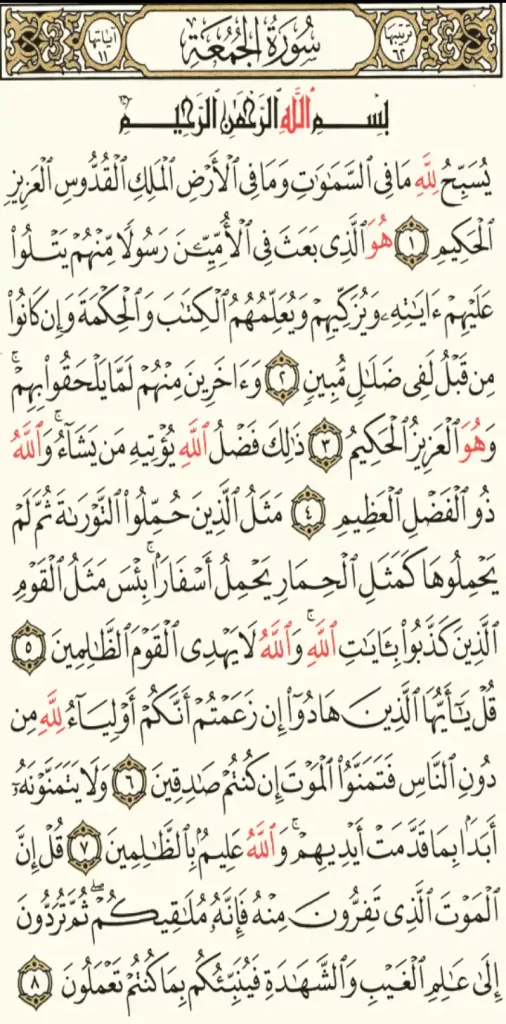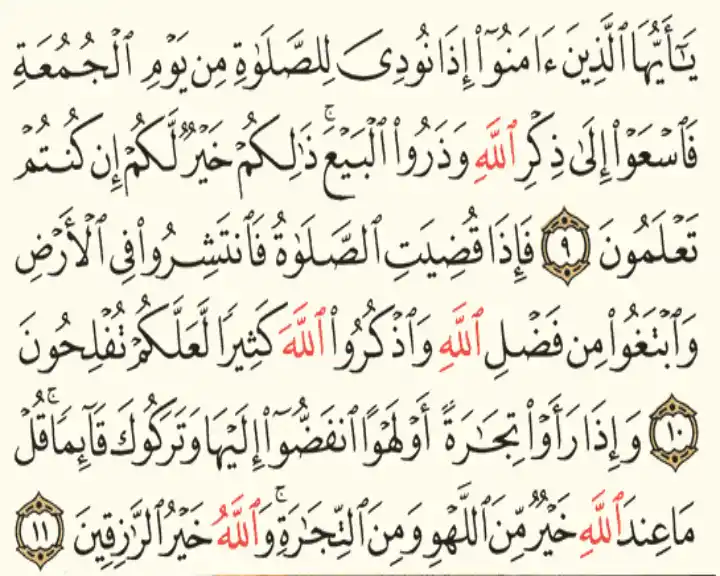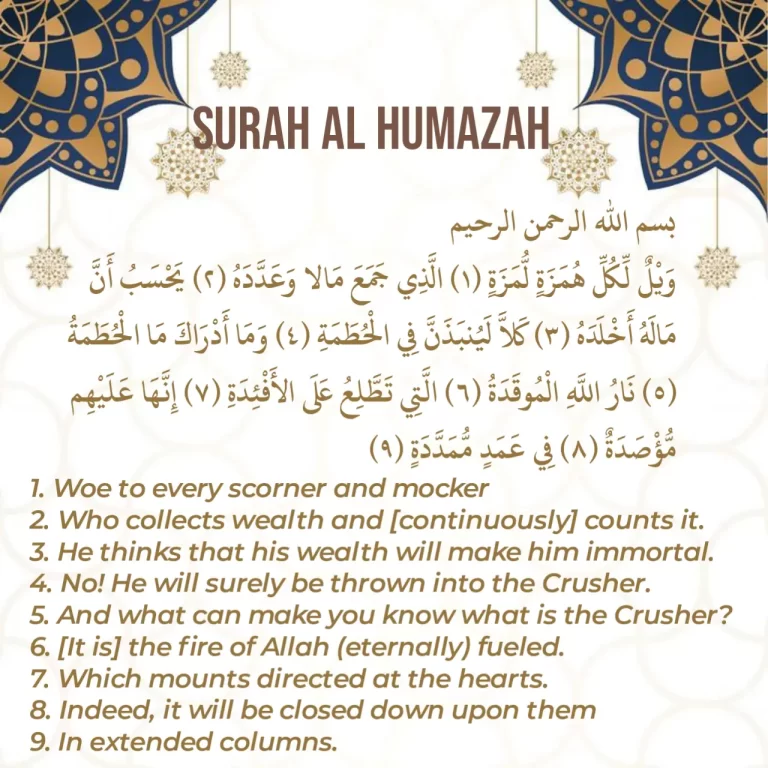Surah Jumma Transliteration, Arabic, And Translation In English
Surah Jumma which means Friday is the 62nd chapter of the Quran. It is composed of 11 verses.
Advertisements
The chapter is named al-jumu`ah “Friday” because it is the day of assembly, when the community abandons trade, transactions and other diversions in favor of assembling to seek the all-encompassing truth and most beneficent and seek the “bounty of God” exclusively (Verse 9).
This surah is an Al-Musabbihat surah because it begins with the glorification of God.
Summary Of Surah Al Jumma
| Name | Congregation, Friday |
| Classification | Madina |
| Surah Before | As-Saff |
| Surah after | Al-Munafiqoon |
| Number of verses | 11 |
| Position | 28 juz |
Surah Al Jummah In Arabic
- بِسْمِ اللَّهِ الرَّحْمَٰنِ الرَّحِيمِ
- 1. يُسَبِّحُ لِلَّهِ مَا فِي السَّمَاوَاتِ وَمَا فِي الْأَرْضِ الْمَلِكِ الْقُدُّوسِ الْعَزِيزِ الْحَكِيمِ
- 2. هُوَ الَّذِي بَعَثَ فِي الْأُمِّيِّينَ رَسُولًا مِنْهُمْ يَتْلُو عَلَيْهِمْ آيَاتِهِ وَيُزَكِّيهِمْ وَيُعَلِّمُهُمُ الْكِتَابَ وَالْحِكْمَةَ وَإِنْ كَانُوا مِنْ قَبْلُ لَفِي ضَلَالٍ مُبِينٍ
- 3. وَآخَرِينَ مِنْهُمْ لَمَّا يَلْحَقُوا بِهِمْ ۚ وَهُوَ الْعَزِيزُ الْحَكِيمُ
- 4. ذَٰلِكَ فَضْلُ اللَّهِ يُؤْتِيهِ مَنْ يَشَاءُ ۚ وَاللَّهُ ذُو الْفَضْلِ الْعَظِيمِ
- 5. مَثَلُ الَّذِينَ حُمِّلُوا التَّوْرَاةَ ثُمَّ لَمْ يَحْمِلُوهَا كَمَثَلِ الْحِمَارِ يَحْمِلُ أَسْفَارًا ۚ بِئْسَ مَثَلُ الْقَوْمِ الَّذِينَ كَذَّبُوا بِآيَاتِ اللَّهِ ۚ وَاللَّهُ لَا يَهْدِي الْقَوْمَ الظَّالِمِينَ
- 6. قُلْ يَا أَيُّهَا الَّذِينَ هَادُوا إِنْ زَعَمْتُمْ أَنَّكُمْ أَوْلِيَاءُ لِلَّهِ مِنْ دُونِ النَّاسِ فَتَمَنَّوُا الْمَوْتَ إِنْ كُنْتُمْ صَادِقِينَ
- 7. وَلَا يَتَمَنَّوْنَهُ أَبَدًا بِمَا قَدَّمَتْ أَيْدِيهِمْ ۚ وَاللَّهُ عَلِيمٌ بِالظَّالِمِينَ
- 8. قُلْ إِنَّ الْمَوْتَ الَّذِي تَفِرُّونَ مِنْهُ فَإِنَّهُ مُلَاقِيكُمْ ۖ ثُمَّ تُرَدُّونَ إِلَىٰ عَالِمِ الْغَيْبِ وَالشَّهَادَةِ فَيُنَبِّئُكُمْ بِمَا كُنْتُمْ تَعْمَلُونَ
- 9. يَا أَيُّهَا الَّذِينَ آمَنُوا إِذَا نُودِيَ لِلصَّلَاةِ مِنْ يَوْمِ الْجُمُعَةِ فَاسْعَوْا إِلَىٰ ذِكْرِ اللَّهِ وَذَرُوا الْبَيْعَ ۚ ذَٰلِكُمْ خَيْرٌ لَكُمْ إِنْ كُنْتُمْ تَعْلَمُونَ
- 10. فَإِذَا قُضِيَتِ الصَّلَاةُ فَانْتَشِرُوا فِي الْأَرْضِ وَابْتَغُوا مِنْ فَضْلِ اللَّهِ وَاذْكُرُوا اللَّهَ كَثِيرًا لَعَلَّكُمْ تُفْلِحُونَ
- 11. وَإِذَا رَأَوْا تِجَارَةً أَوْ لَهْوًا انْفَضُّوا إِلَيْهَا وَتَرَكُوكَ قَائِمًا ۚ قُلْ مَا عِنْدَ اللَّهِ خَيْرٌ مِنَ اللَّهْوِ وَمِنَ التِّجَارَةِ ۚ وَاللَّهُ خَيْرُ الرَّازِقِينَ
Surah Jumma Transliteration
- 1. Yusabbihu lilaahi maa fis samaawaati wa maa fil ardil Malikil Quddoosil ‘Azeezil Hakeem
- 2. Huwal lazee ba’asa fil ummiyyeena Rasoolam min hum yatloo ‘alaihim aayaatihee wa yuzakkeehim wa yu’allimuhumul Kitaaba wal Hikmata wa in kaanoo min qablu lafee dalaalim mubeen.
- 3. Wa aakhareena minhum lammaa yalhaqoo bihim wa huwal ‘azeezul hakeem
- 4. Zaalika fadlul laahi yu’teehi many-yashaaa; wallaahu zul fadlil ‘azeem.
- 5. Masalul lazeena hum milut tawraata summa lam yahmiloohaa kamasalil himaari yah milu asfaaraa; bi’sa masalul qawmil lazeena kaazzaboo bi aayaatil laah; wallaahu laa yahdil qawmazzaalimeen.
- 6. Qul yaaa ayyuhal lazeena haadoo in za’amtum annakum awliyaaa’u lilaahi min doonin naasi fatamannawul mawta in kuntum saadiqeen.
- 7. Wa laa yatamannaw nahooo abadam bimaa qaddamat aydeehim; wallaahu ‘aleemum biz zaalimeen
- 8. Qul innal mawtal lazee tafirroona minhu fa innahoo mulaaqeekum summa turaddoona ilaa ‘Aalimil Ghaibi wash shahaadati fa yunabbi’ukum bimaa kuntum ta’maloon.
- 9. Yaaa ayyuhal lazeena aamanoo izaa noodiya lis-Salaati miny yawmil Jumu’ati fas’aw ilaa zikril laahi wa zarul bai’; zaalikum khayrul lakum in kuntum ta’lamoon.
- 10. Fa-izaa qudiyatis Salaatu fantashiroo fil ardi wabtaghoo min fadlil laahi wazkurul laaha kaseeral la’allakum tuflihoon
- 11. Wa izaa ra’aw tijaaratan aw lahwanin faddooo ilaihaa wa tarakooka qaaa’imaa; qul maa ‘indal laahi khairum minal lahwi wa minat tijaarah; wallaahu khayrur raaziqeen.
Surah Jumma Full Images


Surah Juma in English Translation
- 1. All that is in the heavens and all that is on earth glorifies Allah, the Sovereign, the Holy, the Almighty, the Most Wise.
- 2. It is He Who has sent among the unlettered a Messenger from) among themselves, reciting unto them His revelations, purifying them, and teaching them the Book and wisdom; verily before that they had been clearly misguided.
- 3. And [He has sent him] to others who have not yet joined them. And He is the Almighty, Most Wise.
- 4. That is the grace of Allah, which He bestows upon whomever He wills, for Allah is the Possessor of abundant grace.
- 5. The likeness of those who were given the Torah but failed to uphold it, is that of a donkey laden with weighty tomes. How wretched is the likeness of people who reject the revelations of Allah. And Allah does not guide people who are given to wrongdoing.
- 6. Say: O you who are Jews, if you claim that you are Allah’s chosen, to the exclusion of all other people, then wish for death, if you are telling the truth.
- 7. But they will never wish for it, because of what their hands have wrought. And Allah knows well the wrongdoers.
- 8. Say: Verily the death from which you flee will overtake you. Then in the end you will be brought back to the Knower of the unseen and the seen, and He will inform you about what you used to do.
- 9. O you who believe, when the call to prayer is given on Friday, then proceed at once to the remembrance of Allah and leave off your trading. That is better for you, if only you knew.
- 10. Then when the prayer is ended, disperse through the land and seek Allah’s bounty, and remember Allah much, so that you may prosper.
- 11. When they see some merchandise or distraction, they rush towards it and leave you standing there. Say: That which is with Allah is better than any distraction or merchandise. And Allah is the best of providers.
Tafsir Of Surah Al Jumma
The first verse
That is, everything that is in the heavens and on earth glorifies Allah, submits to His command, shows devotion to Him and worships Him, because He is the Most Perfect, the Sovereign to Whom belongs the dominion of the upper and lower realms, for everything belongs to Him and is under His control.
Advertisements
The Holy Who is venerated and is far above all defects and shortcomings.
The Almighty Who has subjugated all things Most Wiseb in His creation and command.
These great attributes are among the factors that call people to worship Allah alone, with no partner or associate.What is meant by the unlettered is those who had no Book and no remnant of any message, such as the Arabs and others who were not People of the Book.
Allah bestowed a great blessing upon them, that was greater than the blessing He bestowed upon others, because they had nothing of knowledge and goodness, and they were obviously misguided, worshipping trees, idols and rocks, behaving like savage wild animals, with the strong devouring the weak among them.
They were extremely ignorant of the teachings of the Prophets.
Advertisements
But then Allah sent to them a Messenger from among them, whose lineage, noble characteristics and honesty they knew well.
And He sent down to him His Book, so that he recited unto them His revelations, definitive revelations which would lead to faith and certainty.
Purifying them that is, urging them to acquire noble characteristics, explaining them to them, and warning them against evil characteristics.
Advertisements
And teaching them the Book and wisdom that is, knowledge of the Qur’an and knowledge of the Sunnah, which includes all the knowledge of the earlier and later generations.
After this teaching and purification by the Prophet, they became the most knowledgeable of people.
Indeed, they became leaders of the people of knowledge and religious commitment, the most perfect in manners and attitude, the best in conduct and dignity.
They were themselves guided and they guided others, thus becoming leaders of the guided and the foremost among the pious.
Were it not for the favour that Allah bestowed upon them by sending this Messenger, which was the greatest blessing and the greatest beneficence, they would not have attained this honour.
And [He has sent him] to others who have not yet joined them that is, and He has blessed others who are not among them.
This refers to people other than the unlettered, who would come after them, and some of the People of the Book who had not yet joined them.
This refers to people other than those who heard the call of the Messenger directly.
It may be that what is meant is that they had not yet joined them in the sense of catching up with them in terms of virtue, or in terms of time. Whatever the case, both meanings are sound.
Those among whom Allah sent His Messenger, and they saw him and heard his call directly, attained special virtues that no one else could catch up with.
This is by the might and wisdom of Allah, as He has not neglected His slaves or left them without care; rather He sent Messengers among them with commands and prohibitions.
This was by the immense grace of Allah, which He bestows upon whomever He will of His slaves, and it is greater than the blessings of physical well-being, abundant provision and other worldly blessings that He has bestowed upon them.
There is nothing greater than the blessing of Islam which is essential to triumph and eternal happiness.
Having mentioned His blessing to this Ummah, among whom He sent the unlettered Prophet, and what He singled them out for of virtues which no one could catch up with, for they are the unlettered nation who surpassed the first and the last,
Even the People of the Book, who claimed to be the devoted scholars and foremost in knowledge, Allah now tells us that those to whom He gave the Torah, namely the Jews and also the Christians, and instructed them to leam it and act upon it, but they failed to uphold it or implement what they were given, possess no virtue.
Their likeness is that of a donkey that is laden with weighty tomes of knowledge.
Can that donkey benefit from the books on its back? Can it attain any virtue because of that?
Or is its share simply that it carries them?
This is the likeness of the Jewish scholars who do not act upon what is in the Torah, among the most important and significant of which is the command to follow Muhammad, the foretelling of his coming, and the command to believe in what he would bring of the Qur’an.
Has the one who is like that gained anything from the Torah except loss and the establishment of proof against him?
This is the likeness that is applicable to them.
How wretched is the likeness of people who reject the revelations of Allah’p which point to the truthfulness of our Messenger and the truth of what he brought.
And Allah does not guide people who are given to wrongdoingp that is, He does not guide them to that which is in their best interests, so long as they stubbornly persist in their wrongdoing.
One aspect of the stubborn wrongdoing of the Jews is that they are aware that they are following falsehood, yet they claim that they are following the truth, and that they are Allah’s chosen, to the exclusion of all other people.
Hence Allah commanded His Messenger to say to them:
If you are telling the truth in your claim that you are following the right path and are Allah’s chosen, then wish for death.
This is something very easy, for if they believed that they were following the right path, they would not hesitate to meet this challenge that Allah caused to be proof of their truthfulness if they did wish for death, and proof of their falseness if they did not wish for it.
As they did not do that when the challenge was presented to them, it is proven that they are aware of the falseness and corruption of what they are following.
Hence Allah says:
But they will never wish for it, because of what their hands have wrought of sins and acts of disobedience, because of which they fear death.
And Allah knows well the wrongdoers so nothing of their wrongdoing can be hidden from Him.
Even though they do not wish for death, because of what their hands have wrought, and they flee from it, that will not save them; rather they will inevitably face death, which Allah has made inescapable for His slaves and has decreed for them.
Then after death, they will all be brought back, on the Day of Resurrection, to the Knower of the unseen and the seen, and He will inform them of what they did of good and evil, small and great.Here Allah commands His slaves to attend Jumu ‘ah prayer, and to hasten to the prayer as soon as the call is given, proceeding at once to the prayer.
What is meant by proceeding at once here is to hasten to the prayer and pay attention to it, for it is the most important activity of the day.
It does not mean running to join the prayer, because running when going to pray is disallowed.
And leave off your trading that is, cease trading once the call to prayer is given, and go to pray.
That is better for you than focusing on trade and missing the obligatory prayer, which is one of the most important obligations, if only you knew that what is with Allah is better and more lasting, and that whoever gives precedence to this world over religion has truly lost when he thinks he is winning.
This command to cease trading is temporary, for the duration of the prayer.
Then when the prayer is ended, disperse through the land to seek your livelihood and engage in trade.
Because focusing on trade is likely to make one forget to remember Allah, Allah instructs His slaves to remember Him a great deal, as He says:
nd remember Allah much that is, when standing, sitting and lying on your sides so that you may prosper, because remembering Allah much is one of the greatest means of attaining prosperity.
When they see some merchandise or distraction, they rush towards it that is, they leave the mosque, out of eagerness to see that distraction or that merchandise.
They leave what is good, and leave you standing there, addressing the people.
This refers to an incident that occurred one Friday, when the Prophet was addressing the people.
A trade caravan came to Madinah, and when the people heard of it whilst they were in the mosque, they went out of the mosque and left the Prophet addressing the people, and hastened towards that to which they should not have hastened, forgetting their manners.
Say: That which is with Allah of reward for the one who adheres to goodness and is patient in worshipping his Lord is better than any distraction or merchandise.
Although there is some benefit in trade, it is little and tainted, and it will be the cause of missing out on goodness in the hereafter, whereas patience in obeying Allah and continuing one’s act of worship does not cause one to miss out on provision, for Allah is the best of providers.
So whoever fears Allah, He will grant him provision from where he does not expect.
From this surah we learn many things, including the following:
- Jumu’ah prayer is obligatory for all believers and they must proceed to it at once, hasten towards it and give priority to it.
- The two khutbahs on Friday are obligatory and must be attended, because what is meant by remembrance or reminder here is the two khutbahs.
- Allah has enjoined us to go to the remembrance of Allah and hasten to do so. It is prescribed and enjoined to give the call to prayer for Jumu’ah.
- It is prohibited to buy and sell after the call to Jumu’ah prayer. That is only because these actions cause one to miss out on the obligatory duty and distract one from it.
- This indicates that any matter, even if it is permissible in principle, if it results in missing something obligatory, then it is not permissible in that case. It is enjoined to attend the two khutbahs on Friday, and the one who does not attend them is blameworthy.
- What that implies is that one should listen attentively to both of them. The individual should focus on worshipping Allah at a time when he is inclined to turn to distractions and trade, and respond to his desires.
- He should remind himself of that which is with Allah of reward for the one who gives precedence to pleasing Allah over his own whims and desires.
Read also Surah Buruj Transliteration And Translation In English.
From Tafseer As Sa’adi
Advertisements








2 Comments